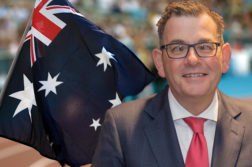For the second time this year the University of Queensland has found itself embroiled in a scandal.
The University of Queensland’s student union (UQU) has been plagued by allegations that the incumbent "Fresh" party rigged the election rules for last week’s student elections. It might seem a petty scandal, but this latest fiasco involves a body that handles millions of dollars of public money, and it raises serious questions about the accountability of such organisations.
Fresh’s victory, announced yesterday, was unsurprising. Party apparatchiks will no doubt laud their personal touch with "the people", but some contributing factors that brought about Fresh’s success this year were considerably more sinister.
Prior to the election, electoral regulations were allegedly changed to shorten the length of time between an election being called and nominations received. But most significantly, on 10 August, a UQU Council meeting passed a resolution to remove part of the regulations which previously protected the names of political parties. This change enabled a group of students with close associations to the incumbent party Fresh to register the name of the main opposition party, "Pulse".
After having prepared campaign materials, members of the main opposition party were informed that they could no longer run under that name. Although initially Fresh released an official statement claiming that the name had been taken due to a factional split in their opposition, it later became clear that the new Pulse ticket included the brother of Fresh President Colin Finke, and that almost all of its candidates attended either the College of Finke, or of the Fresh presidential candidate Rohan Watt.
After a textbook demonstration of the so-called "Streisand effect", Fresh abandoned attempts to deny the specific allegations levelled against them. However, public attention has remained intense. Documents leaked last week to Crikey, for instance, showed that thousands of dollars worth of Fresh political merchandise had been billed directly to the UQU. Finke has claimed that Watt reimbursed the UQU for this spending.
The University of Queensland has ordered an audit of the Union, but has largely sought to distance itself from the scandal. This is an inadequate response. The University is the only body that can exercise real influence over the Union by reason of their bestowal of funding and real-estate. It was clear that the Uni was the only player left standing when the Union’s Electoral Tribunal found itself unable to put a halt to the election on 23 August. The Tribunal is only able to enforce the rules it is given, and has no larger discretionary power to call off an election where it would otherwise not be a free or fair one.
As former Tribunal member and Professor of Law Graeme Orr noted in a radio interview, "If the rules get rigged, the Tribunal are largely hamstrung by that."
In the largest outcry from students in years, hundreds rallied on campus last week calling for the elections to be halted, and thousands more have been involved online on forums such as Facebook and Youtube. An open letter to the University signed by over 30 prominent past and present student leaders has also attracted over 4500 views. The letter, which both authors signed, expressed concerns about the opaque framework in which the Union operates.
In some respects the UQU scandal parallels the decline in governance that occurred at the University of Melbourne’s student union in 2002, where incumbents changed the electoral rules to make it harder for opposition parties to compete. Just a year later, it emerged that office bearers had entered into highly irresponsible transactions that ultimately saw the student union put into liquidation by the Supreme Court of Victoria. An external investigation found a "serious breakdown in governance, financial management and accountability structures" within the union.
Following the scandal, the University of Melbourne developed a transparent and accountable system to deliver both student services and robust student representation. A company with a board comprised of both elected students and Vice Chancellor’s nominees was established to provide the commercial and operational services that students require. Separately, an incorporated student union (UMSU) was established to provide student representation and advocacy. This approach safeguarded the management of financial resources and injected the student union’s governing article with a much-needed dose of transparency.
There is much to be said for appropriating this model at UQ. Even a cursory search on the UMSU website yields complete records of meeting minutes, election notices, Returning Officer appointment and contact details, election appeals and findings, full results for prior elections and copies of the UMSU Constitution and electoral regulations. To obtain these from the UQU you would need to be making near-daily visits to the UQU office complex to check if they’d been tacked onto a noticeboard. Crucially, the UMSU Electoral Tribunal is independently appointed and has the power to set electoral regulations — in stark contrast to the UQU system, in which the incumbent party sets its own rules.
It’s not clear where things will head from here after Fresh’s successful election. The University missed the boat when it came to ensuring a free and fair election took place. However, incoming Vice Chancellor Peter Høj will later this year assume responsibility for building a "culture of integrity", after a comprehensive plan for establishing best practice in accountability and integrity was commissioned in the wake of the recent admissions scandal.
In light of that, and the University’s responsibility to "provide enrolled students with the opportunity to participate in a process to democratically elect student representatives" pursuant to receiving funding from the Commonwealth Government’s Student Services and Amenities Fee, the University will be well-placed to heed Rahm Emanuel’s famous advice, that a good crisis should not be wasted.
Donate To New Matilda
New Matilda is a small, independent media outlet. We survive through reader contributions, and never losing a lawsuit. If you got something from this article, giving something back helps us to continue speaking truth to power. Every little bit counts.



